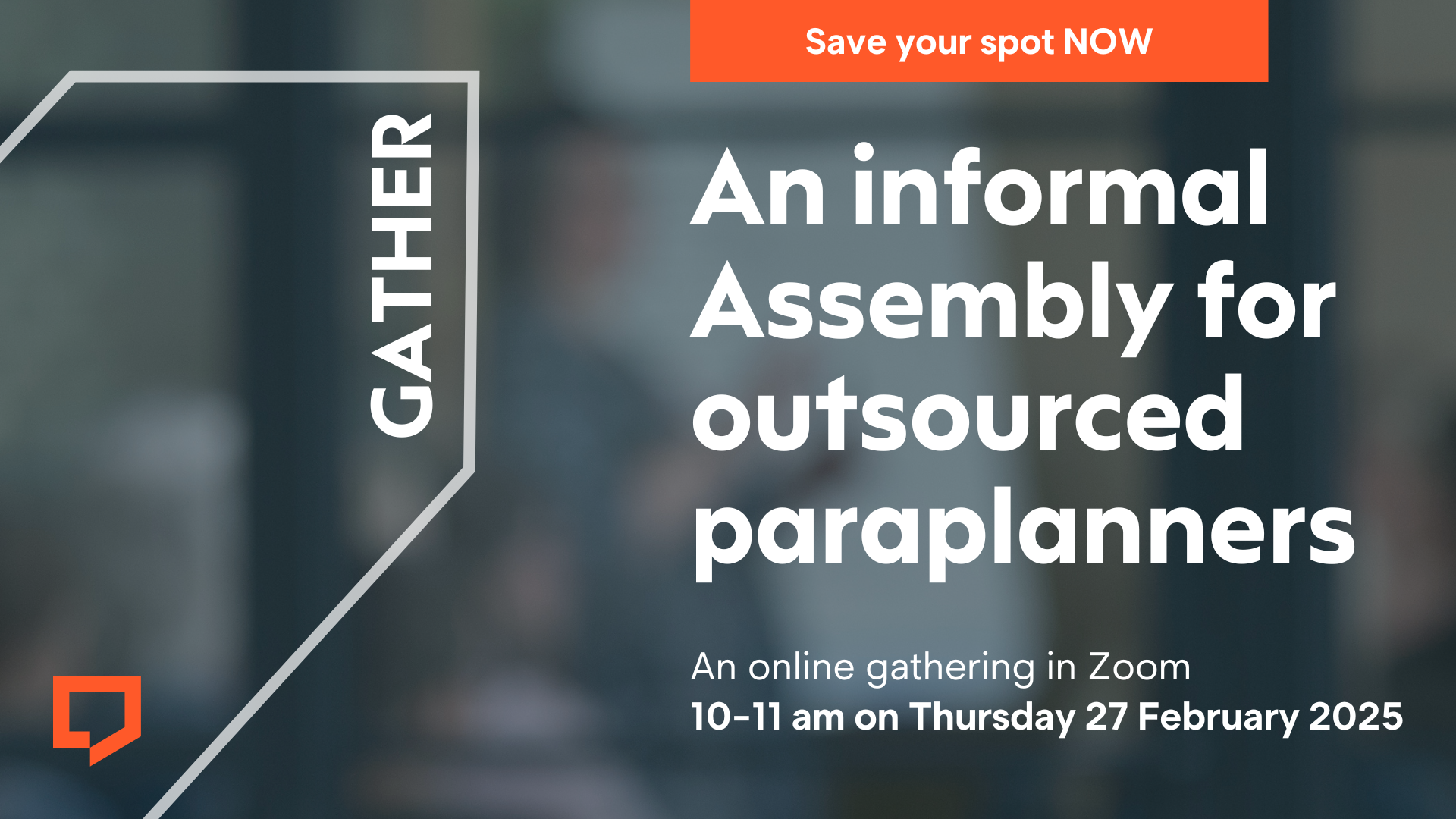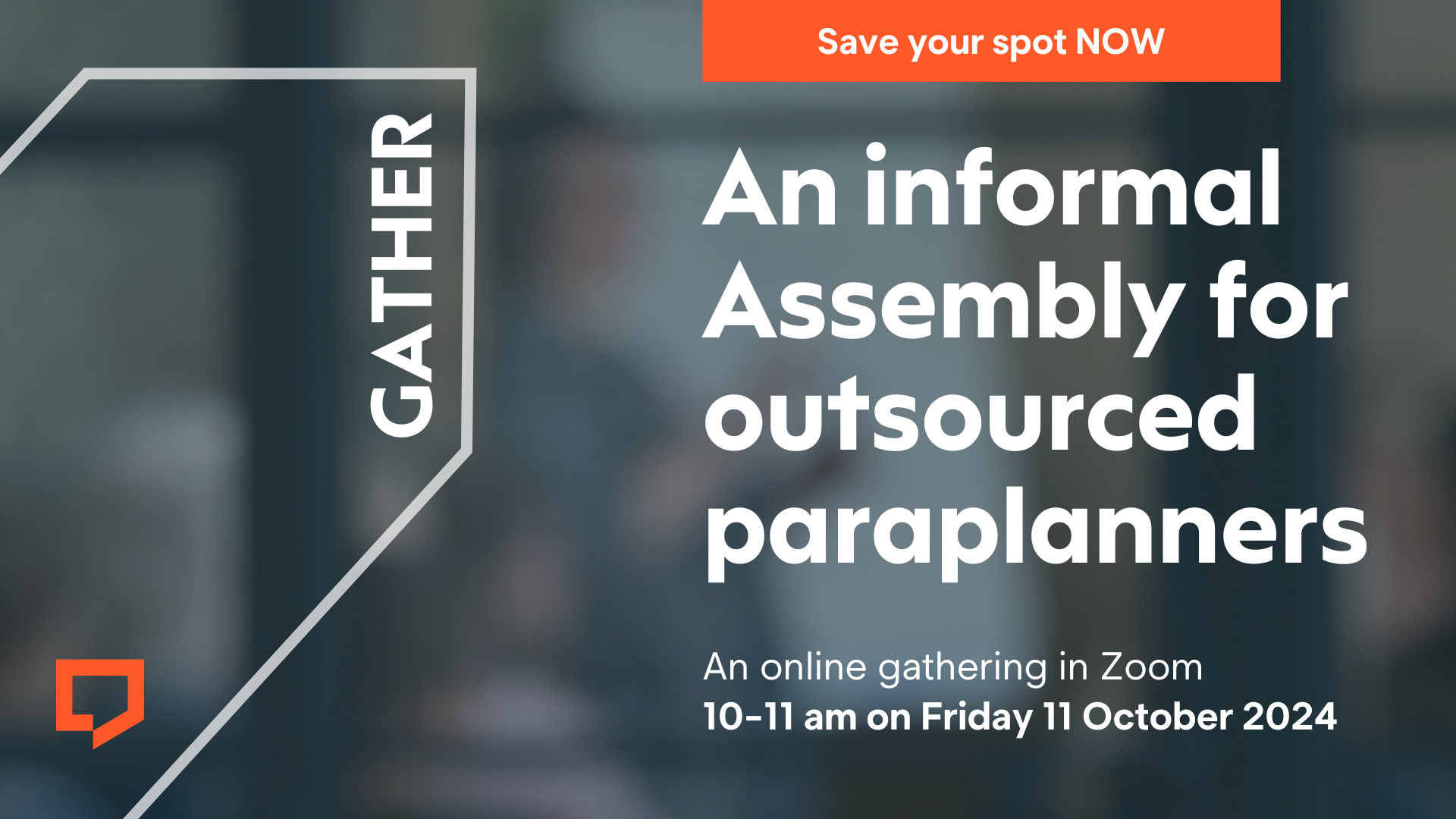
Are you an outsourced paraplanner?
Whether you’re the only employee of your paraplanning practice, or you lead a paraplanning powerhouse with employees and a hefty bank of clients, outsourced paraplanners share lots of things in common.
You just do.
But here’s the thing: despite the growing number of outsourced paraplanners in the UK these days, opportunities to get together to talk only about things that matter in the outsourced world, are surprisingly few and far between.
Switch off. Show up. Join in.
So, if you’re an outsourced paraplanner, here’s our invitation: at 1pm on Thursday 19 June 2025, set your notifications to ‘do not disturb’, click on the Zoom link in your event invitation and gather with other outsourced paraplanners across the UK for an hour of conversation, ideas and practical insights.
There’s nothing to prepare. Just come along ready to share your answer to one question:
‘What’s on your mind today?’
Spaces are limited. To save a spot hit ‘Book Event’ and look out for the calendar invitation in your inbox.
In the second of two specially recorded bite-sized Assemblies, Barnett Waddingham’s James Jones-Tinsley returns to tackle six items of new pension terminology including:
- CDC (collective defined contribution schemes)
- PAA (pensions advice allowance)
- OTA (overseas transfer allowance)
- Crystallised and uncrystyallised pensions funds
- FP2016 or FP16 (fixed protection 2016)
- IP2016 or IP16 (individual protection 2016)
For each item, expect an easy-to-understand definition that also offers a bit of background per term.
In a world that’s awash with word soups and acronyms, James’s jargon buster offers a welcome source of straightforward explanations of often quite complex ideas.
You can also watch the video of this episode on Vimeo or the event page at our website.
Can’t get enough pensions jargon?
Then look out for part one, where James tackles even more new pension terms.
In the meantime, why not tune into James’s trio of old pensions jargon guides? Scroll down and follow the links to watch the videos and podcasts (and visit the event pages for each episode.)
After his popular ‘Plain English guide to old pensions jargon’ Barnett Waddingham’s James Jones-Tinsley has returned to record two specials on new pension terminology called – and we bet you’ll never guess this – ‘A plain English guide to new pensions jargon’ (parts one and two).
In part one, James’s conversation covers five essential terms:
- PCLS (pension commencement lump sum)
- LSA (lump sum allowance)
- LSDBA (lump sum death benefit allowance)
- TTFAC (transitional tax-free amount certificate)
- MPAA (money purchase annual allowance)
For each item, expect an easy-to-understand definition that also offers a bit of background per term.
In a world that’s awash with word soups and acronyms, James’s jargon buster offers a welcome source of straightforward explanations of often quite complex ideas.
You can also watch the video of this episode on Vimeo or the event page at our website.
Can’t get enough pensions jargon?
Then look out for part two, where James will tackle even more new pension terms.
In the meantime, why not tune into James’s trio of old pensions jargon guides here in podcast or video formats? (Or visit the event pages for each episode at our website.)

Are you an outsourced paraplanner?
Whether you’re the only employee of your paraplanning practice, or you lead a paraplanning powerhouse with employees and a hefty bank of clients, outsourced paraplanners share lots of things in common.
You just do.
But here’s the thing: despite the growing number of outsourced paraplanners in the UK these days, opportunities to get together to talk only about things that matter in the outsourced world, are surprisingly few and far between.
Switch off. Show up. Join in.
So, if you’re an outsourced paraplanner, here’s our invitation: at 1pm on Thursday 24 April 2025, set your notifications to ‘do not disturb’, click on the Zoom link in your event invitation and gather with other outsourced paraplanners across the UK for an hour of conversation, ideas and practical insights.
There’s nothing to prepare. Just come along ready to share your answer to one question:
‘What’s on your mind today?’
Spaces are limited. To save a spot hit ‘Book Event’ and look out for the calendar invitation in your inbox.

Are you an outsourced paraplanner?
Whether you’re the only employee of your paraplanning practice, or you lead a paraplanning powerhouse with employees and a hefty bank of clients, outsourced paraplanners share lots of things in common.
You just do.
But here’s the thing: despite the growing number of outsourced paraplanners in the UK these days, opportunities to get together to talk only about things that matter in the outsourced world, are surprisingly few and far between.
Switch off. Show up. Join in.
So, if you’re an outsourced paraplanner, here’s our invitation: at 10am on Thursday 27 February 2025, set your notifications to ‘do not disturb’, click on the Zoom link in your event invitation and gather with other outsourced paraplanners across the UK for an hour of conversation, ideas and practical insights.
There’s nothing to prepare. Just come along ready to share your answer to one question:
‘What’s on your mind today?’
Spaces are limited. To save a spot hit ‘Book Event’ and look out for the calendar invitation in your inbox.
Think you know how to stay safe online? No matter how tech security savvy you think you are, even people who have never known a world without the web can fall victim to sophisticated scams (listen out for the case of a 20 year old digital native who nearly lost £000s in a fake HMRC email scam).
Which is why you should tune in to this eye-opening conversation with Sarah Coles, Parmenion’s head of cyber and resilience.
As a seasoned cybersecurity expert, whose blog posts have acquired almost cult status among readers of the Assembly’s monthly newsletter, Sarah has spent a decade protecting wealth management professionals and practices. In this conversation with host Richard Allum, Sarah shares five practical tips that will help shield you and your business from a world of cyber threats.
Be in the know
Want to know why storing passwords in your browser might be riskier than you think? Or why relying on SMS codes for two-factor authentication could leave you vulnerable? Sarah breaks down complex security concepts into actionable steps you can implement right away.
In fewer than 30 minutes, you’ll discover:
- Why length matters more than complexity for password security
- The truth about backup solutions (no, Dropbox sync isn’t enough)
- How to spot sophisticated phishing attempts that can fool even experts
- Simple ways to protect client data that meet regulatory requirements
- Real-world examples of common security mistakes and how to avoid them
Whether you’re a solo paraplanner or part of a larger team, this conversation offers valuable insights for protecting not only your practice and your clients’ sensitive information but your personal information too.
Tune in and adopt healthy habits
These days, good security isn’t just about the tech you use. It’s about developing smart habits that become second nature. Tune in and, in half an hour, you could be setting out on a lifetime of freshly minted healthy cyber security habits.

Are you an outsourced paraplanner?
Whether you’re the only employee of your paraplanning practice, or you lead a paraplanning powerhouse with employees and a hefty bank of clients, outsourced paraplanners share lots of things in common.
You just do.
But here’s the thing: despite the growing number of outsourced paraplanners in the UK these days, opportunities to get together to talk only about things that matter in the outsourced world, are surprisingly few and far between.
Switch off. Show up. Join in.
So, if you’re an outsourced paraplanner, here’s our invitation: at 10am on Thursday 12 December 2024, set your notifications to ‘do not disturb’, click on the Zoom link in your event invitation and gather with other outsourced paraplanners across the UK for an hour of conversation, ideas and practical insights.
There’s nothing to prepare. Just come along ready to share your answer to one question:
‘What’s on your mind today?’
Spaces are limited. To save a spot hit ‘Book Event’ and look out for the calendar invitation in your inbox.

Are you an outsourced paraplanner?
Whether you’re the only employee of your paraplanning practice, or you lead a paraplanning powerhouse with employees and a hefty bank of clients, outsourced paraplanners share lots of things in common.
You just do.
But here’s the thing: despite the growing number of outsourced paraplanners in the UK these days, opportunities to get together to talk only about things that matter in the outsourced world, are surprisingly few and far between.
Switch off. Show up. Join in.
So, if you’re an outsourced paraplanner, here’s our invitation: at 10am on Friday 11 October 2024, set your notifications to ‘do not disturb’, click on the Zoom link in your event invitation and gather with other outsourced paraplanners across the UK for an hour of conversation, ideas and practical insights.
There’s nothing to prepare. Just come along ready to share your answer to one question:
‘What’s on your mind today?’
Spaces are limited. To save a spot hit ‘Book Event’ and look out for the calendar invitation in your inbox.
Ever wondered how platform’s manage your client’s cash?
In this bite-sized Assembly, Transact’s Glen Sweet reveals all.
You’ll learn how a platform like Transact calculates the aggregate interest earned across a client’s daily trading and longer-term deposit accounts. And also that, because of differences in charging from platform to platform, it’s important to take a closer look at whether and how charges affect interest returned to clients.
If you’re interested in fixed-term deposits on platforms, Glen covers that too.
And let’s not forget about HMRC. Glen explains how different wrappers handle cash interest – from tax-free ISAs to the more complex general investment accounts (GIA).
And finally, did you know there’s a trend among some businesses in the UK – at least at the time of publication in September 2024 – to move corporate cash on to platforms? Tune in to find out why.

Are you an outsourced paraplanner?
Whether you’re the only employee of your paraplanning practice, or you lead a paraplanning powerhouse with employees and a hefty bank of clients, outsourced paraplanners share lots of things in common.
You just do.
But here’s the thing: despite the growing number of outsourced paraplanners in the UK these days, opportunities to get together to talk only about things that matter in the outsourced world, are surprisingly few and far between.
Switch off. Show up. Join in.
So, if you’re an outsourced paraplanner, here’s our invitation: at 10am on Friday 16 August 2024, set your notifications to ‘do not disturb’, click on the Zoom link in your event invitation and gather with other outsourced paraplanners across the UK for an hour of conversation, ideas and practical insights.
There’s nothing to prepare. Just come along ready to share your answer to one question:
‘What’s on your mind today?’
Spaces are limited. To save a spot hit ‘Book Event’ and look out for the calendar invitation in your inbox.
